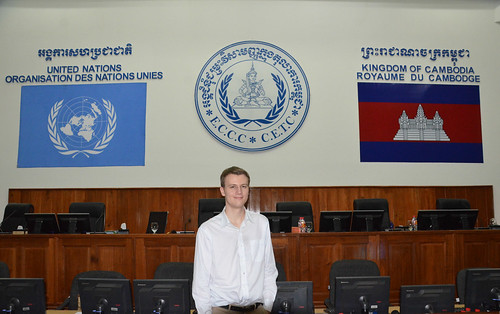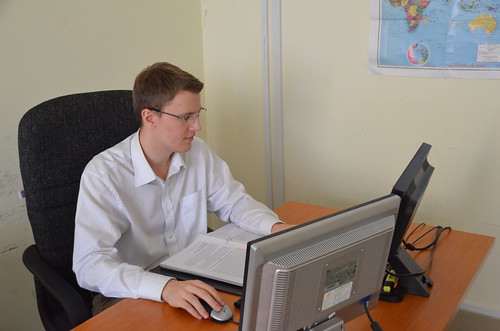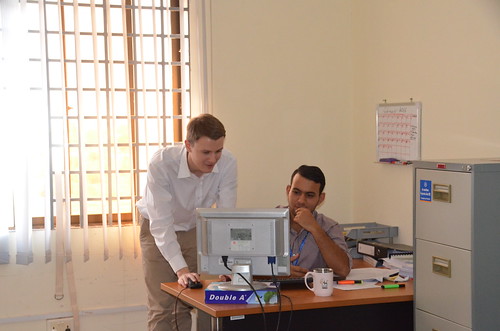The Meet the Court series of the Public Affairs Section was started with a goal: to highlight and celebrate the diverse stories and backgrounds of the people who contribute their knowledge and skills to the Khmer Rouge Tribunal.
In light of the court's continued efforts to achieve its objectives, everyone's role and impact here at the ECCC matters.
We are incredibly pleased to feature Mr. Thomas Vigier, a current UNAKRT intern at the Supreme Court Chamber (SCC), whose substantive knowledge in international criminal law and proven competence in a diverse range of legal skills are presently making valuable contributions to the critical work of the SCC in hearing appeals against decisions and judgments issued by the Trial Chamber.
His excellence in doing all of the significant behind-the-scenes legal work, unquestionable dedication to his craft, and commendable character persist to leave a positive mark among his colleagues.
Meet Thomas in these text and video (bottom of this post) interviews, where he graciously talks about his internship experiences here at the ECCC, his valuable insights about living and working here in Cambodia, and his advice to future UNAKRT interns.
***
1. I’m interested to know more about your academic background and professional experiences, if there are any, before you arrived here in Cambodia to do the UNAKRT internship.
Sure! I have a Master 1 in International and European Law from the Faculté Libre de Droit of Lille, in France, and an LL.M. Degree in Public International Law from the Leiden University, in the Netherlands. After my studies, and before coming to the ECCC (Khmer Rouge Tribunal), I did an internship with the Defense Team at the International Criminal Court (ICC), and then another internship at the Office of Legal Affairs of the United Nations Secretariat.
2. What made you to apply to the UNAKRT internship program?
My first internship experience with the Defence Team at the ICC sparked my interest in seeing a case from the point of view of judges. I knew that the Case 002/01 has reached the appeal stage at the ECCC, and that made me eager to observe the work of the Supreme Court Chamber in this case.
3. You mentioned that you did an internship at the ICC. Now that you are an intern here at the ECCC, what do you think makes the Khmer Rouge Tribunal unique from the ICC?
The structures and objectives of these two courts are very different. The Khmer Rouge Tribunal is unique because it is composed of both Cambodian and international judges who are working here in Cambodia, where most of the living victims of the Khmer Rouge regime and their respective families are located today. The court is based on the principles of restorative justice; it allows the Cambodian society to observe and even participate in the trials. By adjudicating the alleged perpetrators of crimes committed during the Khmer Rouge era, the Cambodian society will be able to close this painful chapter of its history more easily and consequently help them to move forward.
4. So how does your typical workday as a Supreme Court Chamber intern go?
Interns at the Supreme Court Chamber have flexible work planning – our work depends on the needs of the legal officers who supervise us. Because our work here is to support the activities of the Chamber, and that new submissions or requests by the parties are regularly filed, some new and urgent tasks may be given as a matter of priority, thereby requiring us to postpone what we are doing at the moment.
5. Your work seems to be very interesting and fast-paced. In what ways then do you think you are contributing towards the achievement of the court’s objectives?
Well, the Supreme Court Chamber is now seized with an appeal proceeding in Case 002/01, so in that case I and my co-interns are given a wide range of tasks to do. I personally get to conduct legal research, draft or cite-check documents, review evidence, attend hearings, and generally speaking, perform any task that is useful to the Chamber to adjudicate the case.
6. You’re not new to doing internships, so you know that doing an internship comes with its own set of challenges. What challenges have you encountered so far as an intern here at the ECCC?
The biggest challenge for me as an intern at the Supreme Court Chamber, which I also consider as an advantage, is that I am given opportunities to do the same work as the legal officers regarding specific tasks or issues. This is not the case in other internship schemes. The work that I do here requires me to learn fast and develops my competencies.
7. You’ve been an intern here at the court for close to 5 months now. How has the UNAKRT internship program benefited you so far?
This court, in my opinion, is one of the best places for those who have an interest in international criminal law to expand their knowledge and skills rapidly. Each submission or issue raises a number of new legal and factual issues, which are not necessarily clarified in any existing law, and requires a huge amount of research and legal reasoning. Overall, the environment here is just very intellectually stimulating.
I also appreciate the fact that I get to meet a number of very interesting people from all over the world who have different legal backgrounds. My interactions with them regarding different areas of international criminal law have so far allowed me to reflect on my own conception of law. All of these deep talks, reflections, and exchanges are always very enriching for me, particularly when they happen in a hybrid tribunal where we need to take into account Cambodian specificities.
8. Cambodia has been your temporary home for the past months that you’ve been an intern here at the court. How has Cambodia impacted you?
Well, people generally talk about the wonderful landscapes, ancient temples, and tropical weather of Cambodia whenever they go here. All of these things are, of course, very true, but some of them sometimes forget to mention that Cambodian people are incredibly nice, smiling, polite and open-minded. Interacting with Cambodians is always fulfilling because they are really eager to share their culture with you and to hear about yours. I find it very inspiring to see how the Cambodian people, in light of their country’s dark past, is now totally looking at the future.
I also cannot forget the day when I visited the S-21 Detention Center for the first time. I saw many foreigners, probably tourists, crying while looking at the pictures of the victims who were detained, tortured and who perished there. Seeing pictures of the terrorized faces of those detainees, some of them very young, and whose eyes reflected the intense fear and lucidity about what was probably coming next, was properly unbearable to them. I think that the empathy and sorrow that spontaneously arose between these people from different countries for Cambodian people who, 40 years ago, faced a terrible fate, teaches you a lot about human nature and gives a lot of hope for the future of humankind. It shows that we are becoming more aware of human sufferings, all around the planet, and that violence and brutality are progressively delegitimized in modern societies.
9. What key message/s can you share to guide future UNAKRT/ECCC interns?
The work at the Supreme Court Chamber can sometimes be demanding considering the important work and tight deadlines that we have to deal with, but these are precisely the reasons why I am strongly recommending this internship program to anyone who is interested. I think that the ECCC is a great tribunal to acquire real and valuable experience because you are learning directly from international judges and experienced lawyers.
To all the incoming interns out there: one of the most important skills that you need to develop once you are here in Cambodia is bargaining, particularly bargaining the price of a tuk tuk ride!
Watch this video feature of Mr. Thomas Vigier:
Click "CC" if the subtitles on the video don't automatically show.
All credits to Sok Heng/ECCC***
The UNAKRT Internship Programme offers recent university graduates and postgraduate students an opportunity to work in the unique environment of this hybrid tribunal in Cambodia.
Check out this page for more information: http://www.unakrt-online.org


